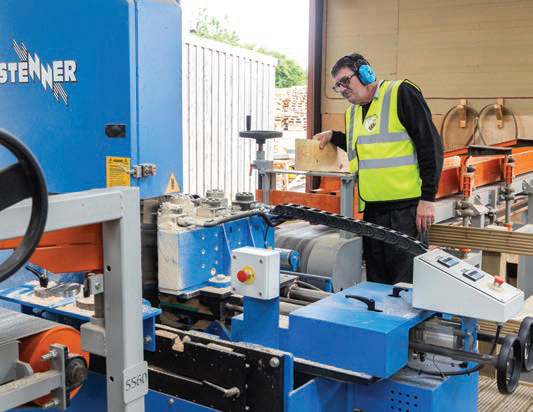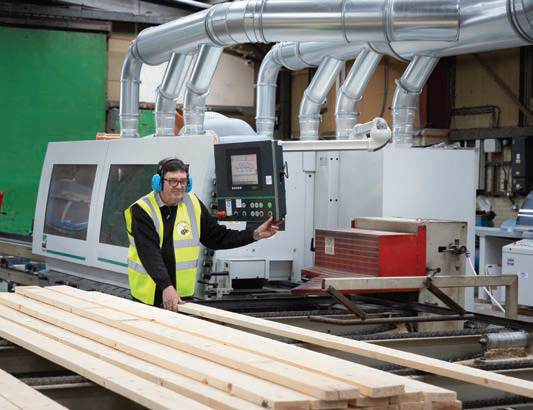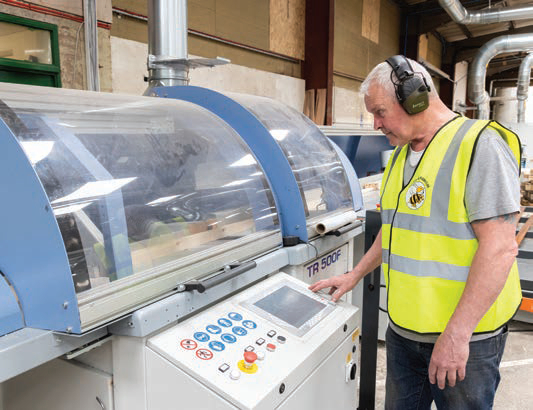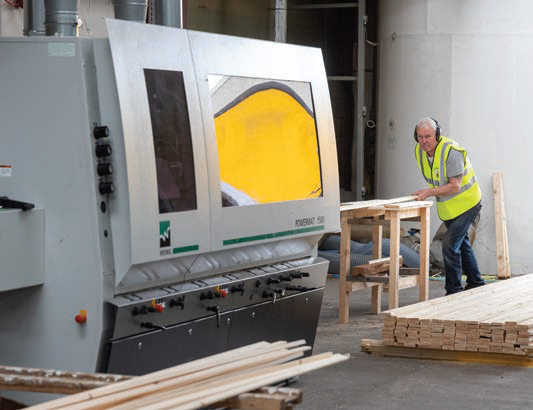Investing in the future
18 October 2022Following a £1.2m investment, Paul Causer, timber mill manager at Beesley & Fildes, explains the impact on the merchant’s timber services and how automated technology is benefiting customers and the business
Established in 2004, the timber mill at our Widnes branch is an important part of our offer. It produces skirting, architraves, flooring, planed timber, door casings and certified fire door casing kits, which are then sold across our 11 branches and online.
As well as supplying a broad range of different timber types and supplies, the facility can fulfil bespoke orders, providing customers with specialist services such as matching legacy timber features and providing like-for-like timber details for heritage projects. In short, if a product can be made from timber, then we can make it at the mill.
Our investment programme has been driven by a surge in demand for timber supplies across our branches. As highlighted by the Timber Trade Foundation (TTF) last year, upticks in the housing market, and the repair, maintenance and improvement sector are fuelling growth and keeping timber orders high. The government’s net zero targets are also adding to this trend, with the construction industry now proactively seeking to use products such as timber to help reduce carbon emissions.
In response, we wanted to enhance our capabilities to boost efficiency and throughput, ensuring our customers benefit from reliable and cost-effective supply with full accountability, traceability and quality assurance.
SMOOTHING TIMBER PROCESSING
New technology focused on automation is central to our investment and this has seen us replace and upgrade our planing equipment. We have introduced two machines from Weinig, a market leader in machines and systems for solid wood and panel processing. The company’s technology is focused on maximising productivity and ease of use, enabling us to boost throughput and deliver a consistently excellent finish.
The new Weinig P3000 planing and profiling line allow us to process up to 120 linear metres of timber per minute – a 600% increase on our existing equipment. With lightweight tooling, digital programming, programme storing and pre-set capabilities, it is also much easier and quieter to run, helping us to optimise resources and improve the working environment for our team, while maintaining high quality and service standards.
The P3000 adds to a P1500 timber moulding machine. Both can be pre-programmed, and settings stored for repeat jobs, enhancing efficiency and enabling faster operation with only one operative required for each machine.
INCREASING AUTOMATION
To further enhance our timber services, we have invested in a fully automated Stenner resaw. With much higher feed speeds than traditional models, this enables us to quickly and effectively cut larger pieces of timber into smaller and thinner sections. These cut sections can then be converted into skirting boards, fence panels and feather-edged boarding using the moulding machines.
The resaw machine is complemented by automated stacking equipment at the back of the equipment, which further increases efficiency and productivity.
Our industry-leading resaw technology provides us with increased capacity and broader in-house processing capabilities to boost supply chain reliability for customers.
We have also acquired a small saw from Stenner to replace another legacy machine, providing additional capacity for angle fillets and featheredged timber.
Our increased focus on automation filters through to cross-cutting, which has seen us invest in advanced equipment from Stromab. This has enhanced the range of door casing and certified fire door casing sets we can offer across our branch network. This new technology not only enables us to cross-cut large pieces of timber for door linings, but also the head for the frame and the trench, which the sides of the door frame slot into.
The machine is being used to produce 12 door casing variants – six different casing widths, with two alternative aperture sizes – along with certified fire door casings that have a pre-profiled recess for intumescent material.
EMBRACING DIGITAL TECHNOLOGY
Investment in all five machines has been co-ordinated with an upgrade to the mill’s extraction system and tool room, ensuring the facility provides a safe and comfortable environment for our team. At the same time, this facility has benefited from new digital technology, which is driving significant time efficiencies and future proofing our timber milling capabilities.
Now digitally enabled, the tool room allows our experienced timber engineering and processing team to load CAD drawings of timber profiles straight to the new machines, driving significant time efficiencies.
Previously, this process involved drawing the profiles by hand onto graph paper and transferring them to a steel template. A profile grinder would then be used to make steel cutters for the profile, which from start to finish, could take up to two hours.
Using digital technology enables the same process to be completed in as little as 20 minutes. The integrated digital system also provides superior levels of accuracy, real-time management information and the ability to prioritise work flows based on our customers’ specific needs.
SHAPING THE FUTURE
The introduction of more automation across the timber mill is bringing new skills into the business while enhancing health and safety. New employees no longer have to spend time learning how to operate old - and often complex machinery, requiring a specialist skillset and knowledge. Our focus is now on nurturing a workforce with more computer-based skills. As the automated equipment is very user-friendly, only limited training is required, which is also helping to open opportunities for a broader range of people.
In addition, we hope to recruit a timber machinist apprentice. This will help us to further invest both in the future of our business and our community with an opportunity for a young person to develop skills in the sector.
More traditional timber processing will continue to play a key role in our industry, but to keep up with an ever-growing demand for timber products, builders merchants have to take steps to keep up. At Beesley & Fildes, our significant investment in our timber mill and shift towards automation will ensure we can meet that aim and provide a high quality service that meets our customers’ needs now and in the future.



